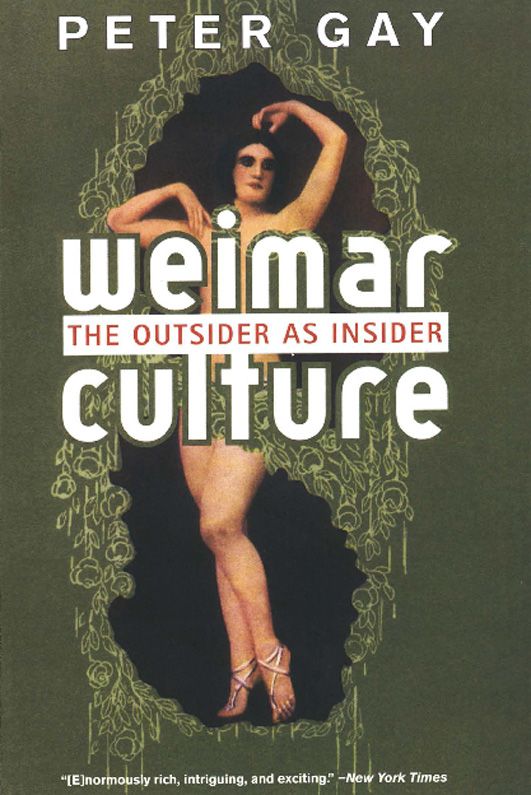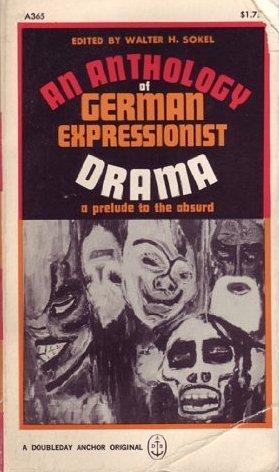Peter Gay: Weimar Culture: The Outsider As Insider (1968–) [EN, CR]
Filed under book | Tags: · 1910s, 1920s, 1930s, architecture, art, bauhaus, cinema, expressionism, film, germany, literature, modernism, music, nazism, philosophy, politics, psychoanalysis, theatre, weimar republic

First published in 1968, Weimar Culture is one of the masterworks of Peter Gay’s career. A study of German culture between the two wars, the book brilliantly traces the rise of the artistic, literary, and musical culture that bloomed ever so briefly in the 1920s amid the chaos of Germany’s tenuous post-World War I democracy, and crashed violently in the wake of Hitler’s rise to power. Despite the ephemeral nature of the Weimar democracy, the influence of its culture was profound and far-reaching, ushering in a modern sensibility in the arts that dominated Western culture for most of the twentieth century.
First published by Harper & Row, New York, 1968.
Publisher W. W. Norton, 2001
ISBN 0393322394, 9780393322392
205 pages
via chef
Review (Walter Laquer, The New York Times Books, 1968)
Review (Elizabeth Wiskemann, The Spectator, 1969)
Review (Sterling Fishman, History of Education Quarterly, 1970)
Weimar Culture: The Outsider As Insider (English, 1968/2001, EPUB)
Weimarksa kultura: Isključenik kao uključenik (Croatian, trans. Danja Šilović-Karić, 1999, added on 2014-8-3)
Lotte H. Eisner: The Haunted Screen: Expressionism in German Cinema and the Influence of Max Reinhardt (1952/1969)
Filed under book | Tags: · 1910s, 1920s, cinema, expressionism, film, film criticism, film history, germany, romanticism, theatre

The expressionist era of German cinema began at the end of the First World War and ended shortly after the coming of sound. From The Cabinet of Dr. Caligari onwards the principal films of this period were characterized by two influences: literary Expressionism, and the innovations of the theatre directors of this period, in particular Max Reinhardt. This book demonstrates the connection between German Romanticism and the cinema through Expressionist writings. It discusses the influence of the theatre: the handling of crowds; the use of different levels, and of selective lighting on a predominately dark stage; the reliance on formalized gesture; the innovation of the intimate theatre. Against this background the principal films of the period are examined in detail. The author explains the key critical concepts of the time, and surveys not only the work of the great directors, such as Fritz Lang and F. W. Murnau, but also the contribution of their writers, cameramen, and designers.
First published as L’Écran démoniaque. Influence de Max Reinhardt et de l’Expressionisme, 1952; revised 1965.
Translated by Roger Greaves
Publisher Thames and Hudson, London, 1969
360 pages
via knappen
Review (Richard B. Byrne, Cinema Journal, 1970)
PDF (116 MB)
Comment (0)Walter H. Sokel (ed.): An Anthology of German Expressionist Drama: Prelude to the Absurd (1963)
Filed under book | Tags: · expressionism, literature, theatre

“The literary upheaval that spread through Europe in the first decades of the 20th century found its distinctive form in German Expressionist drama, one of the forerunners of the modern Theatre of the Absurd. The movement was characterized by revolt against prevailing mores and institutions, an attempt to capture the subliminal suggestiveness of the dream, and by extremism. This anthology, selected by Walter H. Sokel, Associate Professor of German Literature and Humanities at Columbia University, illustrates the common preoccupations and the strikingly different techniques of the movement. Among the plays are:
Reinhard Sorge’s The Beggar, Carl Sternheim’s ‘comedy’, The Strong Box, two plays by the expressionist painter Oskar Kokoschka, Murderer the Women’s Hope and Job, Georg Kaiser’s Alkibiades Saved, Walter Hasenclever’s Humanity, Yvan Goll’s The Immortal One, and Rolf Lauckner’s Cry in the Street. The last play, Brecht’s Baal (appearing here for the first time in English in a translation by Eric Bentley and Martin Esslin) clearly indicates the direction to be taken by Brecht himself, and by others, and points the way to the spirit of Camus, Genet, and the nihilism of the mid-century.
Four manifestoes on their art by Kaiser, Ludwig Rubiner, Paul Komfeld, and Goll preface the collection, and in his detailed Introduction, Professor Sokel explores the social and literary origins of the works and interprets the playwrights’ aims and techniques to give a clear and comprehensive definition of the genre.” (from the back cover)
Translated by Walter H. Sokel, Joseph Bernstein, Michael Hamburger, Jacqueline Sokel, Maurice Edwards, Valerie Reich, Bayard Quincy Morgan, Eric Bentley and Martin Esslin
Publisher Anchor Books, Doubleday, Garden City/NY, 1963
367 pages
via leninbert
Review: Leonard Quirino (Modern Drama, 1965).
PDF (16 MB)
Comment (0)
